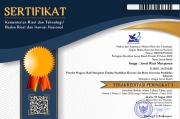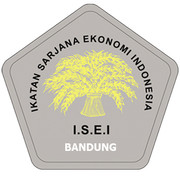PASAR MODAL SYARIAH SEBAGAI DAYA TARIK INVESTOR UNTUK MENINGKATKAN KINERJA PASAR MODAL INDONESIA
Abstract
The number of Islamic stock investors is growing. This demonstrates that public interest in halal investment has increased, despite the fact that the number is still tiny when compared to Indonesia's total population. The purpose of this research is to see if the rise in investment interest has an effect on the Islamic stock trading frequency, with the goal of improving the performance of the Indonesian capital market as assessed by the Composite Stock Price Index (JCI). The methods used are descriptive and verification. Path analysis is used to analyse the data. According to the study's findings, a rise in Single Investor Identification (SID) of Islamic stocks on the JCI had no direct effect. Furthermore, it has not been demonstrated that the frequency of Islamic stock trading functions as a moderating variable. Additional tests have revealed that Islamic stock trading frequency has a direct effect on the JCI. Furthermore, the SID and the trading frequency have significant impacts on the JCI at the same time. Based on these findings, it is hoped that capital market stakeholders will continue to collaborate to develop policies that will have a significant impact on the capital markets' performance by increasing socialization, education, and activation.
Keywords
Full Text:
PDFReferences
Abdalloh, I. (2018). Pasar Modal Syariah. Jakarta: Elex Media Komputindo.
Acharya, A. S., Prakash, A., Saxena, P., & Nigam, A. (2013), Sampling: why and how of it?. Indian Journal of Medical Specialities, 4(2), 330-333. https://doi.org/10.7713/ijms.2013.0032
Bayar, Y., Kaya, A., & Yildirim, M. (2014). Effects of Stock Market Development on Economic Growth: Evidence from Turkey. International Journal of Financial Research, 5(1), 93-100. https://doi.org/10.5430/ijfr.v5n1p93
Ben Salem, M., Fakhfekh, M., & Hachicha, N. (2016). Sukuk Issuance and Economic Growth : The Malaysian Case. Journal of Islamic Economics Banking and Finance, 12(2), 202–214. https://doi.org/10.12816/0045554
Bursa Efek Indonesia. (2021). Produk Syariah. Retrieved from https://www.idx.co.id/idx-syariah/produk-syariah/
Fahmi, Irham. (2014). Manajemen Keuangan Perusahaan dan Pasar Modal. Jakarta: Mitra wacana Media
Groh, A. P., & Wallmeroth, J. (2016). Determinants of venture capital investments in emerging markets. Emerging Markets Review, 29, 104–132. https://doi.org/10.1016/j.ememar.2016.08.020
Hadi, N. (2015). Pasar Modal (Edisi 2). Yogyakarta: Graha Ilmu.
Herzi, A. A. (2010). An overview of Islamic Capital Market in Malaysia. Malaysia.
Jalilvand, A., Noroozabad, M. R., & Switzer, J. (2018). Informed and uninformed investors in Iran: Evidence from the Tehran Stock Exchange. Journal of Economics and Business, 95, 47–58. https://doi.org/10.1016/j.jeconbus.2017.08.004
Jogiyanto. (2015). Teori Portfolio dan Analisis Investasi (Edisi Kesembilan). Yogyakarta: BPFE.
Kaustia, M., & Torstila, S. (2011). Stock market aversion? Political preferences and stock market participation. Journal of Financial Economics, 100(1), 98–112. https://doi.org/10.1016/j.jfineco.2010.10.017
Kawamura, T., Mori, T., Motonishi, T., & Ogawa, K. (2021). Is Financial Literacy Dangerous? Financial Literacy, Behavioral Factors, and Financial Choices of Households. Journal of the Japanese and International Economies, 60(February), 101131. https://doi.org/10.1016/j.jjie.2021.101131
Lee, C. C., Chen, M. P., & Lee, C. C. (2021). Investor attention, ETF returns, and country-specific factors. Research in International Business and Finance, 56(January 2020), 101386. https://doi.org/10.1016/j.ribaf.2021.101386
Listriono, K., & Nuraina, E. (2015). Peranan Inflasi, Bi Rate, Kurs Dollar (Usd/Idr) Dalam Mempengaruhi Indeks Harga Saham Gabungan (Ihsg). Jurnal Dinamika Manajemen, 6(1), 73–83. https://doi.org/10.15294/jdm.v6i1.4298
Mubarok, K. (2018). Peran Sosialisasi dan Edukasi Dalam Menumbuhkan Minat Investasi di Pasar Modal Syariah. Inovasi, 14(2), 113–122. Retrieved from http://journal.feb.unmul.ac.id/index.php/INOVASI
Mutakif, F., & Nurwulandari, A. (2014). Pengaruh Volume Perdagangan Saham, Nilai Tukar Dan Indeks Hang Seng Terhadap Pergerakan Indek Harga Saham Gabungan. Jurnal Ilmiah Akuntansi Dan Bisnis, 7(2), 178–192.
Nasution, Y. S. J. (2015). Peranan Pasar Modal Dalam Perekonomian Negara. HUMAN FALAH: Jurnal Ekonomi Dan Bisnis Islam, 2(1), 95–112.
Nordin, S., & Nordin, N. (2016). The impact of capital market on economic growth: A Malaysian outlook. International Journal of Economics and Financial Issues, 6(7Special Issue), 259–265.
Otoritas Jasa Keuangan. (2020). Laporan Perkembangan Pasar Modal Syariah: Peluang Di Tengah Tantangan. Otoritas Jasa Keuangan.
Permata, C. P., & Ghoni, M. A. (2019). Peranan Pasar Modal Dalam Perekonomian Negara Indonesia. Jurnal Akun Stie, 5(2), 50–61.
Prasetyo, Y. (2017). Hukum Investasi & Pasar Modal Syariah. Bandung: Mina.
Riduwan & Kuncoro, E. A. (2017). CaraMenggunakan dan Memaknai Path Analysis (Analisis Jalur). Bandung: ALFABETA.
Rinaldo, D. and Puspita, V.A. (2021), "Education and Socialization Investment Galleries to Improve Capital Market Inclusion", Barnett, W.A. and Sergi, B.S. (Ed.) Environmental, Social, and Governance Perspectives on Economic Development in Asia (International Symposia in Economic Theory and Econometrics, Vol. 29A), Emerald Publishing Limited, Bingley, pp. 169-184. https://doi.org/10.1108/S1571-03862021000029A025
Silviyani, N. L. N. T., Sujana, E., & Adiputra, I. M. P. (2014). Pengaruh Likuiditas Perdagangan Saham Dan Kapitalisasi Pasar Terhadap Return Saham Perusahaan Yang Berada Pada Indeks Lq45 Di Bursa Efek Indonesia Periode Tahun 2009-2013. E-Journal S1 Ak Universitas Pendidikan Ganesha, 2(1), 1–11.
Sugiyono. (2017). Metode Penelitian Bisnis (Pendekatan Kuantitatif, Kualitatif, Kombinasi dan R&D). Bandung: Alfabeta.
Tandelilin, E. (2012). Analisis Investasi dan Manajemen Portofolio. Teori dan Aplikasi. Yogyakarta: BPFE.
Taslim, A. & Wijayanto, A. (2016). Pengaruh Frekuensi Perdagangan Saham, Volume Perdagangan Saham, Kapitalisasi Pasar dan Jumlah Hari Perdagangan Terhadap Return Saham. Management Analysis Journal, 5(1), 1–6. Retrieved from http://maj.unnes.ac.id
Terovitis, S. (2020). Information disclosure and the feedback effect in capital markets. Journal of Financial Intermediation, 100897. https://doi.org/10.1016/j.jfi.2020.100897
Tumewu, F. J. (2019). Minat Investor Muda Untuk Berinvestasi Di Pasar Modal melalui Teknologi Fintech. Jurnal Imliah Manajemen Bisnis dan Inovasi, 6(2), 133–146.
Widiyanti, M., & Sari, N. (2019). Kajian Pasar Modal Syariah Dalam Mempengaruhi Pertumbuhan Ekonomi di Indonesia. Ekonomikawan: Jurnal Ilmu Ekonomi Dan Studi Pembangunan, 19(1), 21–30. https://doi.org/10.30596/ekonomikawan.v19i1.3236
Yadirichukwu, E., & Chigbu, E. (2014). The impact of capital market on economic growth: the Nigerian Perspective. International Journal of Development and Sustainability, 3(4), 838–864.
Yamori, N., & Ueyama, H. (2021). Financial Literacy and Low Stock Market Participation of Japanese Households. Finance Research Letters, (March), 102074. https://doi.org/10.1016/j.frl.2021.102074
Zou, J., & Deng, X. (2019). Financial literacy, housing value and household financial market participation: Evidence from urban China. China Economic Review, 55(March), 52–66. https://doi.org/10.1016/j.chieco.2019.03.008
DOI: https://doi.org/10.17509/image.v11i1.39265
Refbacks
- There are currently no refbacks.
Copyright (c) 2022 Vina Anggilia Puspita, Gunardi Gunardi
Image : Jurnal Riset Manajemen is licensed under a Creative Commons Attribution-ShareAlike 4.0 International License
View My Stats



